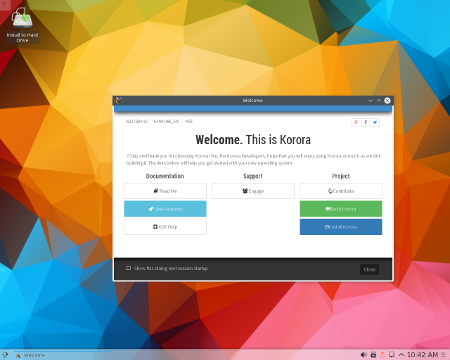Korora
Korora nasce col desiderio di rendere Linux semplice per i nuovi utenti, mentre deve rimanere utile per gli esperti. L’obiettivo primario è di fornire un sistema completo e semplice da usare per applicazioni generiche. In origine era basato su Gentoo Linux mentre ora si basa su Fedora.
Versione 22: Selina
Questa versione contiene(in Inglese):
First things first; a break with tradition. Being set in Australia, our releases are normally named after Finding Nemo characters, however in honour of the birth of a daughter to core contributor Maik Adamietz (DarkEra) and his wife, we’ve decided to name this release after her. Meet, Selina. Congratulations Maik!
Now, on with the show.
Thanks to our continued support from core contributors Maik Adamietz (DarkEra) and Jim Dean (ozjd) we have been able to retain our Xfce, Cinnamon and MATE editions for another cycle. Also, a shout out to Leigh Scott (leigh123linux) for his help with Cinnamon.
Features
Derived from Fedora 221, Korora benefits from Fedora’s long tradition of bringing the latest technologies to open source software users.
A complete list with details of each new inherited feature is available at the Fedora 22 Change Set page.
Faster and better dependency management with DNF
With Korora 22 we’re introducing a major change under the hood; we’re now using DNF and hawkey to manage packages. DNF is much like the Yum software package manager (it’s largely command-line compatible), but re-written and re-engineered to provide optimal performance and (along with Hawkey) provide a strict API definition for plugins and extending projects. DNF also makes use of the libsolv library initially pioneered by the openSUSE Project to provide faster and better dependency management.
It also boasts a better performance and memory footprint vs. Yum, and is designed to have a cleaner codebase and be easier to maintain.
Elasticsearch
Elasticsearch is full-featured and very popular self-standing open source indexing server, and now it’s available with just a “yum install elasticsearch” – no, wait, make that “dnf install elasticsearch” 🙂
GNU Compiler Collection 5
Korora 22 comes with GCC 5.1 as the primary compiler suite.
Captive Portal Detection
Korora GNOME, by default, enables a captive portal detection that requests known content from a trusted Fedora server. If the request is redirected, a window automatically appears for you to interact with the portal’s login webpage.
To disable this feature, remove /etc/NetworkManager/conf.d/20-connectivity-fedora.conf
Developer orientated firewall
Developers often run test servers that run on high numbered ports, and interconnectivity with many modern consumer devices also requires these ports. The firewall in Korora GNOME, firewalld, is configured to allow these things.
Ports numbered under 1024, with the exceptions of sshd and clients for Samba and DHCPv6, are blocked to prevent access to system services. Ports above 1024, used for user-initiated applications, are open by default.
Refer to https://fedoraproject.org/wiki/FirewallD for details on customizing the firewall configuration, or use the firewall-config package for a graphical tool.
Cinnamon 2.6
This new release of Cinnamon targets a improvements in responsiveness, load times and CPU usage as well as various improvements under the hood. Refer to the Cinnamon release announcement for more details.
MATE 1.10
This new release of MATE continues to deliver important changes under the hood of this GNOME 2 fork. Refer to the MATE release announcement for more details.
GNOME 3.16
GNOME developers have provided many enhancements to streamline and improve the GNOME Desktop Environment. Notifications have been significantly reworked and many applications saw numerous improvements including Files, Boxes and Image Viewer. Refer to the GNOME Release Notes for more details.
KDE Plasma 5
Plasma 5, the successor to KDE Plasma 4, is now the default workspace in the Korora KDE edition. It has a new theme called Breeze, which has cleaner visuals and better readability, improves certain work-flows and provides overall more consistent and polished interface. Changes under the hood include switch to Qt 5 and KDE Frameworks 5 and migration to a fully hardware-accelerated graphics stack based on OpenGL(ES). Refer to the KDE Plasma 5.3 for more details.
Xfce 4.12
The Xfce spin has been updated to Xfce 4.12. This release has an enormous number of improvements, including HiDPI support, improvements to window tiling, support for Gtk3 plugins, and many improvements for multi-monitor support. Refer to the Xfce release announcement for more details.
But wait, there’s more …
- Ruby 2.2 Ruby 2.2 is the latest stable version of Ruby. Many new features and improvements are included for the increasingly diverse and expanding demands for Ruby. With this major update from Ruby 2.1 in Fedora 21 to Ruby 2.2 in Fedora 22, alongside JRuby, Fedora becomes the superior Ruby development platform.
- Perl 5.20 A new perl 5.20 version brings a lot of changes done over a year of development. See 5.20.0 perldelta for more details.
- Vagrant Create and configure lightweight, reproducible, and portable development environments with Vagrant. It comes configured with the libvirt provider as a default.
Risorse
La distribuzione può essere scaricata da:
- 64 bit KDE (2,5GB): http://downloads.sourceforge.net/kororaproject/korora-22-x86_64-kde-live.iso
- 64 bit Cinnamon (1,8GB): http://downloads.sourceforge.net/kororaproject/korora-22-x86_64-cinnamon-live.iso
- 64 bit Gnome (2GB): http://downloads.sourceforge.net/kororaproject/korora-22-x86_64-gnome-live.iso
- 64 bit XFCE (1,8GB): http://downloads.sourceforge.net/kororaproject/korora-22-x86_64-xfce-live.iso
- 64 bit MATE (1,9GB): http://downloads.sourceforge.net/kororaproject/korora-22-x86_64-mate-live.iso
Il sito web della distribuzione è: https://kororaproject.org/
Il sito web per sviluppatori è: http://sourceforge.net/projects/kororaproject/
Screenshot

Conclusioni
Gli sviluppatori chiedo aiuto alla comunità per poter far crescere la distibuzione.